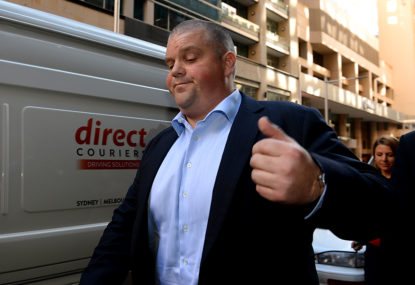Young excellence, promotion battles, and a happy farewell: The Australian team of the week from players around the globe
Even though St.Pauli ultimately lost a high-scoring affair, Jackson Irvine was a standout, as well as scoring a late goal.

There remains no news as to whether Brisbane Roar owners the Bakrie Group have been successful in finding a buyer for their franchise license.
This follows in the wake of the Newcastle Jets having their license taken over by the FFA.
The narrative has often focused on the owners being overdue on various fees, such as player payments becoming sporadic.
But in the case of the Roar, there is the pheonomenon of officials from another sporting code criticising the ownership structure, while going as far as to filing wind up motions which speaks of a form of spillover effect.
It is worth considering these are only symptoms. In the case of owners, the end-game symptoms of their involvement are where it comes to the point they simply aren’t willing to lose money anymore.
Often the belligerent personality of owners – such as mining magnates who weren’t required to develop a diplomatic customer service professionalism in building their business – has attracted criticism. The football fraternity have been critical of these owners, without fully analysing the merits of their grievances.
That is to say the governance approach of the FFA has fostered a climate that is not only investor unfriendly and in need of improvement, it is arguably hostile.
There’s a real sense the FFA want to have their cake and eat it; they want to offload the losses and then take a substantial cut out of any profitable aspect of the A-League.
This hampers any capacity for owner investors to make up losses.
A good example is the revenue raised from off-season matches against notable overseas clubs. The introduction of the All-Stars concept is of a similar vein to the FFA negotiating league-wide sponsorship rights for its own profit, and then preventing constituent A-League teams from negotiating sponsorship rights with competitor companies.
This becomes a problem in the future because ultimately it means the FFA have to step in to fully subsidise a sizeable portion of teams when the franchise licenses are handed back.
This in turn means any profits they had gleaned are not only wiped out but they have to spend more money than would be the case with a robust self-sufficient A-League meaning there is less money for socially beneficial women’s and youth programs.
An appropriate mix for the finals series would be that participating teams would get 50 per cent of gate takings as prize money. Of that, 25 per cent should be invested back into the league as a whole via distribution to the other teams (or a central marketing fund) and 25 per cent should go the FFA (aka the game as a whole).
The All-Stars concept should be scrapped, as it directly undermines the credibility of the A-League’s constituent teams, it is a form of throw-back to a time when Manchester United would have to play the Socceroos.
A-League teams can gain valuable cut-through in brand building via the higher drawing teams. Financially the gains can make up for losses throughout the season.
At the same time we need to be able to look far into the future and prevent future issues.
If the league is to be one day attractive to investors in a similar mould to the English Premier League, there is always the potential for interests to become invested in the game that don’t have the sport’s best interests at heart.
This is why fan and local business ownership should be incorporated into the ownership operating structure. This isn’t actually too hard if membership becomes exactly that, instead of a different name for season tickets.
There comes the issue of control. On the one hand there is a need for private investors to have scope to implement innovative ideas – through website and online content in particular – and forge strategic sports business partnerships.
It would not however be too problematic for fans to essentially be given voting rights and control over aspects such as playing kit design for example.
Another benefit of partial fan ownership is stability. If an owner suddenly has to pull out for economic reasons, as it stands currently a sizeable vacuum is left in its wake.
However if fans half own and fund the team there is less of a vacuum.
All of this has to take place within the realms of an autonomously run A-League – not a fully independent A-League – as is often advocated.